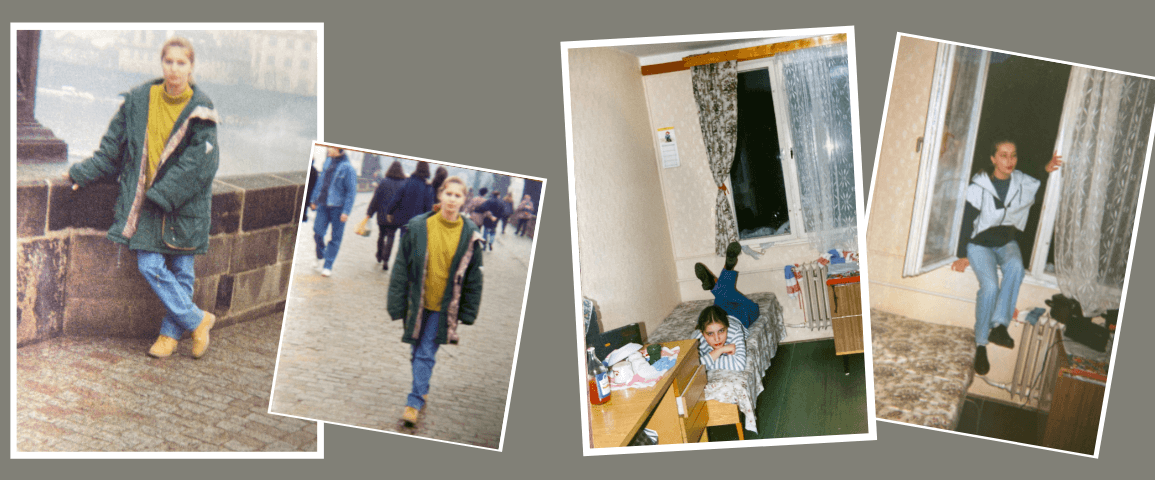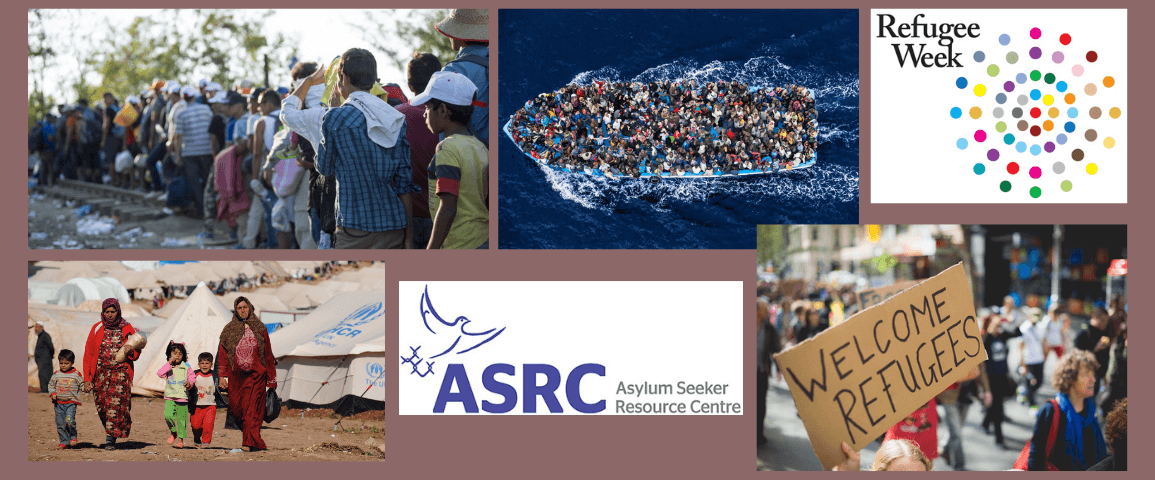Did you know Sassy Organics is a business that’s founded and run by a former refugee? Yep, and given we’re currently in Refugee Week (June 20 – June 26), we thought it was a great time to share founder Aida’s Bosnian refugee story. Refugee Week is Australia’s major annual event designed to inform the public about refugees and celebrate their contribution to Australian society; this year’s theme is ‘unity’. Read on to hear Aida’s journey fleeing Bosnia and moving around Europe before settling in Australia.
I was born in a small town, Brcko, in Bosnia and Herzegovina where I lived with my mum, dad and my older sister for the first 12 years of my life until 1992 when the Bosnian war broke out. As Yugoslavia fell apart, Bosnia fought for its independence – the war was violent and bloody. With the conflict and violence nearing, my mum, my sister and I fled home on the 30th of April 1992. We headed to a nearby village for safety, with nothing more than our pyjamas, thinking we’d be back the next day. That was almost 30 years ago now – we never returned home. The day we left was the last time I saw my most my friends, my neighbours and some of my family members. We left everything behind, including my dog and photographs, which means I don’t remember and have no way of knowing how my sister and I looked growing up. But we were just grateful to survive, as so many have lost more than photographs.
For the next four years, between 1992 and 1995, my family and I sought refuge. We lived in more places than you could imagine, being sent from one refugee camp to another and bouncing from country to country (Croatia, Czech Republic and Germany). Life was tough, although I did enjoy not going to school for, well, years. We had no money, no home, no set future. Each day was the same in the camps. And our lives mostly involved listening to the radio for the latest news about atrocities that were happening at home.
My childhood was not, by any stretch of the imagination, normal. Most refugees could attest to that. I didn’t grow up listening to music, reading cool magazines or watching the latest TV shows. We had one TV, which was shared between over 100 residents and the main channel was the news. I grew up listening to horror stories, broadcasted from my war-torn home, Bosnia – not something a 12-year-old should ever have to listen to. I also heard the stories of other survivors in the camps who had been through the most horrible experiences that a human being could endure. Some of those stories will stay with me forever.
Despite my childhood being out of the ordinary, I made the most of it. And I kept busy. At age 14, I learnt how to cut boys' hair, and made some pocket money that way. I also worked for an American company, sorting pigeon rings (strange I know!). I was paid something like five cents for every 100 rings...I am pretty sure this is called child labour. But it was common for people to take advantage of us.
I can still remember one of the first purchases I made with the money from the part-time jobs: my first deodorant, a Rexona. Little did I know that some 25 years later I would have enough deodorant in stock to last me a lifetime! Another item I remember clearly is my oversized jacket, which you can see me wearing in Prague in the pictures below. This jacket was at least 4–5 sizes too big. But when you have little money, you settle with what you're given. You never complain because when you know there's no alternative – sometimes that’s the best way to be.

In December 1995, we made it to Australia. We had been living in Germany as refugees for some time, our humanitarian visas were expiring but the war was still raging in Bosnia, so we had no home to go to. My sister’s in-laws had arrived in Australia a year prior, also as refugees, so we knew Australia would be a safe place for us to start a new life. We applied to go there on humanitarian visas. Once the Australian embassy in Germany told us our visas were approved, we didn’t waste any time packing and preparing for our move.
Leaving friends, yet again, was difficult. But harder still was saying goodbye to my grandma. Knowing we were going so far away and that her health was not good, I wasn’t sure I’d ever see her again. She was supposed to come to Australia once we had settled there, but decided instead to return home, despite it being dangerous to do so. My grandma returned to the same apartment she’d spent most her life in and passed away peacefully in her sleep seven days later. Since fleeing Bosnia, my grandma had wanted nothing more than to return home, which she managed to do seven years later. Although she died happy, she left me with a huge hole in my heart and the pain of never being able to see her again.
My new life in Australia started in Dandenong, where I still live now, 25 years on. I went to Dandenong High School and even though I couldn’t say a word in English I met some beautiful people who welcomed me and helped get through the tough period of my teenage life. Trying to fit in was difficult at the beginning, as my English was limited or non-existent. It was hard to make new friends at age 16, and I spent most of the first year alone at the library, hiding the fact I had no friends. But by the following year I made some friends and felt like I belonged there...at last. And by the time I got to year 12, I felt completely at home.
I’m so grateful for the opportunities that living in Australia has given me. I call Australia home now. I love everything about this country: its people, the solidarity and the acceptance of different cultures. I call myself an Aussie, although I do have an accent which I’m pretty sure will never go away!
My refugee experience and the hardships I’ve faced because of it have, of course, been obstacles in my life. But growing up a refugee also gave me a different perspective – it taught me to value life more and to find happiness in the small things. I don’t feel like my past defines me and I’ve been lucky, and strong, enough to not hold onto any past darkness like grief and loss. I’m a happy person, overall, and I find that I don’t dwell on things, thanks to the resilience that my refugee years taught me. If I do have a difficult or bad day, I always know and remind myself that the next day will be brighter. This sort of attitude has helped me throughout my life, in many different situations. I’m also forever grateful that my family and myself have been in good health, as that’s something I know is so incredibly difficult to go through.
If there was any advice that I could give to others, it would be to do the things in life that you really love! There are always going to be challenges and reasons not to do something, but I’ve learnt that there are also just as many (if not more) ways to overcome these obstacles. Don’t settle: if you’re not happy with your job, find ways to change it. That’s what I did when I changed from a career in Criminology to starting an organic, all-natural e-commerce store (but that’s a story for another day). Making big changes are always easier said than done, so just start somewhere and start small. We spend way too many hours at work not to be happy with what we do. If there’s something new that you’d like to try or you want to change your whole career as I did, don’t wait for the perfect or magic moment – there probably won’t be one. Instead, make that decision, commit to it and take your first step. The rest will follow.
As you know, this week is Refugee Week, which is why I want to acknowledge the difficulty that refugees are going through all over the world right now. It feels horrible to leave your town, thinking you will be back the following day, only to never return to the place you once called home. My heart goes out to all those that have experienced war or that had to flee their homes for political reasons. Currently, millions of people across the globe have been forcibly displaced from their homes due to persecution, violence and human rights violations. At the end of 2018, there were 3.5 million people seeking asylum and 25.9 million refugees. My refugee experience stole my childhood from me. Today, over half of the world’s refugees are children.
I was lucky enough to make Australia my home and in 2018, Australia was home to over 56,000 other refugees from around the globe. But there are still hundreds of people seeking asylum who don’t get adequate protection if they reach or near Australia and thousands of refugees that need community support to build a life here. That’s why this year’s Refugee Week theme is ‘unity’ – encouraging everyone to work together to build even more cohesive, accepting and inclusive communities where everyone from all walks of life can thrive together.

There are countless ways you can get involved to help asylum seekers and refugees in your local community and Australia more broadly. Volunteering with a local organisation, signing petitions, taking part in activism/awareness-raising, and donating or fundraising are all great ways to help. If you’re in Victoria, then the Asylum Seekers Resource Centre is a good place to start. You can also educate yourself further on the Australian asylum and refugee system, and the cultures of the refugees that come here to build more cultural awareness and understanding. If you’d like to learn more and find organisations or ways to get involved, then visit the Refugee Council of Australia site here.
Thank you so much for listening to my story and for supporting me and Sassy Organics! Being a part of the Aussie business scene is one of the many ways this country has helped me feel I truly belong. And for that, I am always grateful.
– Aida xo